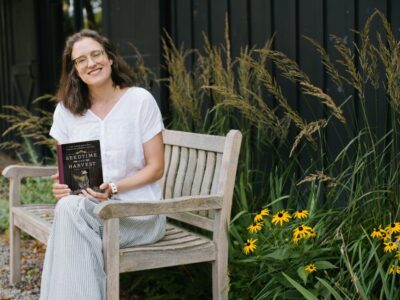Obedience to the call of the Lord can lead you in wild and unexpected places. For Ben Hofecker, his dad Terry Hofecker, and the team at Soil1, that calling has carried them away, from working with drones and remote sensing work to deploying soil test kits to farmers around the globe.
“The greatest challenge we face in the 21st century is food security,” Ben Hofecker shared. “As Christians it’s our responsibility to take care of the soil and people. It is something we can’t neglect.”
Healthy soil means healthy food, and healthy food means healthy people. Soil1 is doing its part to make sure the farmer knows the state of the ground underneath their feet.
From Swords to Plowshares
Prior to launching Soil1, Ben worked in the drone and remote sensing business, using drones for a variety of applications including archeological digs in Israel, research, law enforcement, transportation, and defense. About five years ago, they started to explore precision agriculture applications using drones and sensors.
“We learned that our most effective national defense was about food security overseas,” Ben said. One of the largest threats to our security rested in whether other nations were starving. “There are soft things we need to do to ensure long-term national defense.”
The team launched a focus group to investigate how drones and sensors could be used to improve and impact small-scale farmers and agriculture in developing countries. What they learned changed the way they looked at things. The focus group said the drone footage from the air was great, but the problem was simpler: “I don’t even know what’s going on in my ground.”
During a meeting about smart field automation with several individuals from JAIN Irrigation, one of the largest irrigation companies in the world, Ben got a fast education on the developing world. “They told us the whole smart field is great, but the things we need to do in India are very simple. In the developing world, we don’t need to automate the combine through the field because there’s no combine in the field, there’s someone in the field. Taking a job away from someone is hurting the economy, not helping it.”
“At that point we had a choice,” Ben said. “We could take drones headed toward the cybersecurity defense path, or we could feed the world and beat swords into plowshares.”
One-Step Field Soil Test Kits

The team started looking for simple tools that could make a big difference.
Rafiq Islam, PhD, Soil & Bioenergy Program Leader at The Ohio State University, had developed a simple, one reagent test for active carbon in soil, which is a measure of the soil’s overall health. Soil 1 LLC worked with Dr. Islam to develop inexpensive soil ecology testing solutions that could take place on a farmer’s field instead of in a far-off laboratory. The team has applied for patents for the special formulation in the United States and six other countries.
The basic kit allows a farmer anywhere in the world to sample their own soil, test it, and determine its quality in no less than 30 minutes. The test measures the active carbon in the soil—which is the carbon that’s ready and available for a plant to uptake—and categorizes it as poor, fair, good, or excellent using a color scale.
The tests cost about $1 each.
Soon, Soil1 will have a version of the test that will provide a color range of 60 variations. The team is also working with OSU to develop an application that will take test results and log them into a program farmers can use to track their crops and inform their decisions.
“The biggest thing is its affordability and ability to empower smallholder farmers,” said Ben. “There are applications for large-scale commercial farmers, but it really empowers the individual.”
Soil sampling and testing even in the United States can be costly and time prohibitive, but in developing countries, it can be impractical and nearly impossible. Simply the expense of getting a truck into town and navigating a backlog of lab requests makes it difficult to get an accurate test result.
Even the no-till community and soil pioneers in the United States have traditionally sent out test samples of their crops only every two or three years. With the Soil1 test kits, farmers can test after each cover crop rotation to learn how they’re doing.
And for developing nations overseas, “We don’t have to wait for a lab or add an expense for research projects. We can equip them to start immediately.” In places like South Africa and India, many farmers have never had a soil test done on their land—it’s a data set that doesn’t exist. The field test kits can make it simple to test and monitor farmers’ own soil while generating a dataset that is usable for governments and farmers who have no idea what’s going on with their soil right now.
God’s Path from Southern Ohio to South Africa
While Terry and Ben were making their plans and exploring potential partnerships in India and Israel, God was preparing another path.
Out of the blue, Soil1 received a call from individuals who worked at Mangosuthu University of Technology (MUT) near the city of Durban, South Africa. They were looking for ways to spur on regenerative agriculture efforts and entrepreneurship in the surrounding communities of South Africa.
Dr. Rafiq Islam, the inventor of Soil1’s formulation, was heading to South Africa already to speak, so Terry made plans to go along and scheduled a meeting with MUT in Durban.
Terry also serves on the executive board of the Brethren Church, which has a relationship with Pastor Sandile Mkhwanazi in Durban, South Africa, so as part of their trip, Terry planned to stay with Sandile for a time.
Sandile happens to work with Christian farming organizations in Durban.
Sandile accompanied Terry to his meeting with MUT’s head of marketing and an ag researcher.
“All of these relationships started coming together,” Ben said. “Then, the ag researcher wanted to know if we knew where Carroll, Ohio was. Did we know Dave Brandt?”
David Brandt was an early advocate for sustainable farming, a man of faith, and a leading pioneer in the regenerative soil movement. He passed away earlier this spring after being injured in a car accident. i
“David was a pioneer in bridging the gap between the farmer, the researcher, and the community,” Ben shared. “He would always start with the farmer and the farmer’s needs, pair up with a researcher, and then look for ways to tie the researcher to some kind of commercialization arm,” so solutions could make it into the hands of as many farmers as possible.
Brandt’s work has contributed to the foundation of a burgeoning agricultural ecosystem in Ohio, marrying together both regenerative ag advances and the entrepreneurial spirit needed for technological innovations to make a lasting impact in the world.
The driving force behind the regenerative soil movement is the Ohio farmer, says Ben. “Innovation begins with farmers with needs, going out to find researchers and people to partner with.” It’s literally a grassroots effort. “Innovative farmers have a knowledge for doing basic research on their farms. Farmers are scientists.”
In a way only God can orchestrate, all of these people have converged to address the needs of farmers in South Africa and other developing nations around the world.
“We can make plans but God directs the path,” Ben said. “I’m along for the ride.”





 Copyright
2024
Root and Vine
Copyright
2024
Root and Vine